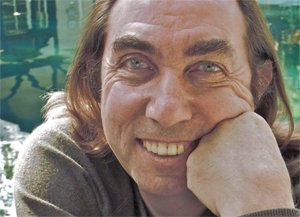In the room with writer Pen Densham

The second annual Toronto Screenwriting Conference runs at Ryerson University’s Ted Rogers School of Management April 9th & 10th.
All this week, Playback will feature Q&As with some of the all-star cast of writers leading the Conference, including writer/producer/director Pen Densham (Robin Hood: Prince of Thieves), animation writer Butch Hartman (The Fairly Oddparents), gaming scribe Kevin Shortt (Avatar: The Game), comedy writer/executive producer Christine Zander (Nurse Jackie) and Leonard Dick (The Good Wife, Lost, House).
A Q&A with Pen Densham
British-born writer-producer-director, Pen Densham, attributes the break that launched his Hollywood career over thirty years ago to filmmaking legend Norman Jewison. Pen’s credits include Robin Hood: Prince of Thieves, Backdraft, Moll Flanders, and sci-fi series The Outer Limits and The Twilight Zone.
Pen is a two-time Academy Award nominee and recipient of more than 60 international awards including a medal from the Queen for his contribution to the Arts in Canada. He could soon add Best-Selling Author to his list of credits with his new book, Riding The Alligator: Strategies for a Career in Screenplay Writing (and not getting eaten). Pen will lead a workshop on Surviving a Career in Screenwriting moderated by Jennifer Deyell, former writer-in-residence at the CFC.
What was your first writing project for which you were both credited and paid?
When I discovered that the CBC was initiating a series for young filmmakers I saw it as an opportunity to write my first drama script, which became If Wishes Were Horses, a half-hour short. I had no idea how to format a dramatic script and just wrote from the heart. I was lucky enough to be supported by Julius Kohanyi and Barry Pearson who enthusiastically supported my project, which not only was I paid for but also I got to direct.
Did anyone give you words of advice when you started out?
Coming from a documentary background and landing in Hollywood the first successful screenwriter I met was Sylvester Stallone. He described a very instinctual process – essentially he told me what took me years to trust: write from the heart, write what you believe in. Strangely, I have found the scripts of mine that got made were not the ones studios paid me to write but ones I wrote for myself.
Who is your favorite character you’ve written and why?
After writing Robin Hood: Prince of Thieves, I instinctively felt that I was going to write an historical woman’s story next. I researched several major characters from history and one day discovered myself writing the last five lines of a historical movie – that became Moll Flanders, a script that poured out of me like I was channeling it.
It was written in secret, away from my male partners. Only my female assistant knew about it, as I was nervous that it would evaporate if I exposed it too early. This was the reverse of my Robin Hood process, which I wrote openly. Moll, for me, represents a truth that I passionately believe in – that perfectionism is destructive and that one can be deeply loved, despite the normal flaws of human nature.
Is there a screenwriter you admire? Who and why?
Aside from many friends who I will not offend by naming one over the other, I am quite in awe of Robert Bolt, Paddy Chayefsky, and I’m pretty intimidated by Canada’s Paul Haggis, who are all a few of the writers I stand in the shade of.
What advice would you give screenwriters today?
I teach an annual semester to MFA students at USC and I make two statements, one: ignore everything I say that goes against your creative instincts, because those are sacred; and two: I urge them not to make what I call ‘errors of omission’.
When I look back the times that I have doubted myself out of attempting to create an opportunity or to take on a challenge or take on a situation that might embarrass me if it failed – were all guaranteed 100% failures and have stayed with me, annoying me for that doubt. Better to have ‘errors of co-mission’, having tried and failed, because once in a while I have seen some astounding successes when I have found a way to approach a difficult task.
Robin Hood was written after three studios passed on it. Need I say more?

 The definitive CDN broadcast and production resource.
The definitive CDN broadcast and production resource.










